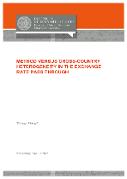Method versus cross-country heterogeneity in the exchange rate pass-through

Datum vydání
2023Nakladatel / Místo vydání
Institute of Economic Studies, Faculty of Social Sciences, Charles University in Prague (Prague)Informace o financování
UK/GAUK/GAUK254623
Metadata
Zobrazit celý záznamKolekce
Abstrakt
Estimates of the exchange rate pass-through vary significantly across studies, making it difficult for policymakers and researchers to ascertain the true impact of exchange rate fluctuations on domestic prices. I conduct a meta-analysis to understand why estimates differ and provide consensus for the conflicting results. My dataset includes 32 primary studies containing 684 estimates for 108 countries. Because there are many potential causes of heterogeneity, I use Bayesian model averaging to identify the most important ones. I find that estimates vary due to differences in country-specific and methodological characteristics. The country-specific characteristics include central bank independence, inflationary environment, and economic development, while the methodological variables include data frequency, data dimension, and data time span. When I control for differences in methodology and assign greater weight to those that reflect the best practices in the literature, I find that the implied pass-through estimates remain substantial, albeit smaller than suggested in the literature. The pass-through is 6% for developed countries and 9% for developing countries.
Klíčová slova
exchange rate pass-through, prices, heterogeneity, meta-analysis
Trvalý odkaz
https://hdl.handle.net/20.500.14178/1913Licence
Tento výsledek je zpřístupněn v režimu gratis open access, tj. pouze pro čtení. V souladu s § 30 zákona č. 121/2000 Sb., autorského zákona, lze plný text z repozitáře také stáhnout, případně vytisknout, ale pouze pro osobní potřebu.


